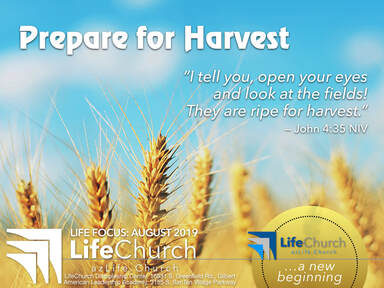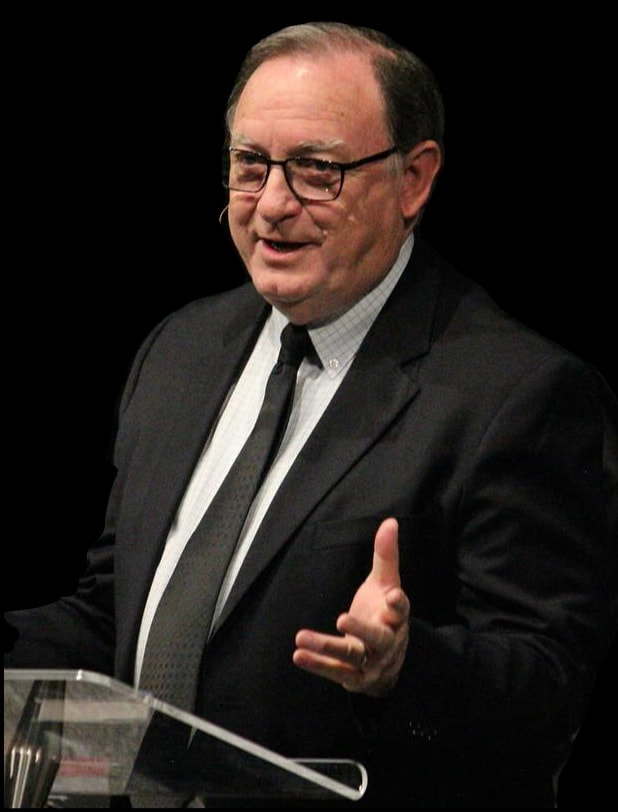AuthorTerry R Baughman is Lead Pastor for LifeChurch in Gilbert, AZ. See his complete bio at trbaughman.com Archives
July 2024
Categories |
Back to Blog
Sowing the Seed8/3/2019  PREPARING FOR THE HARVEST Terry R. Baughman “But this I say: He who sows sparingly will also reap sparingly, and he who sows bountifully will also reap bountifully. … Now may He who supplies seed to the sower, and bread for food, supply and multiply the seed you have sown and increase the fruits of your righteousness” (2 Corinthians 9:6, 10). A fundamental principle of Scripture and of nature is that one will reap what has been sown. Anyone familiar with gardening, farming, or agriculture understands the principle well. Whatever produce is desired requires the same kind of seed in the beginning stage as expected in the final outcome. Whether it is corn, potatoes, strawberries or peaches the first stage is the planting, cultivating, watering, and waiting for the appropriate stages of growth, maturity and reaping. From Jesus’ teaching of the parable of the sower and the soils (Luke 8:5–10), to Paul’s analogy of sowing in death and reaping in resurrection (1 Corinthians 15:35–38; 42–44), there is an abundance of biblical illustrations relating to the process of planting and harvest. These stories connect with us because we all enjoy the produce of agriculture and benefit from the principles of growth. They are easily understandable and convey the kernel of truth. Paul said, “A man reaps what he sows” (Galatians 6:7-8 NIV). Though this is often quoted in a negative context, it may also be applied to a positive promise. If good things are sown we can expect a harvest of like kind. If love and kindness are planted, goodness and mercy will follow. The harvest is the anticipated outcome. Produce comes in the fulfillment of the growing season. Planting is never performed for practice and sowing is not the end of good deeds. There is always an expectation of growth, development, fruition, and harvest. Planting is not in vain and produce is never a surprise; it is expected. Can we sow the seeds of spiritual increase with faith for the eventual return? Can we confidently toil in the Lord’s vineyard with the assurance that we will drink from the fruit of our labor? Planting requires faith. When the seed is placed in the ground we can no longer see it. We may wonder if anything is happening, if growth is beginning, or if we have lost our investment in the dirt. Dirt is cheap. It is abundant. It has no food value and we wonder if it has what it takes to bring for the young plant. We must have faith in what we cannot see. Faith is “the evidence of things not seen” (Hebrews 11:1). That is what makes it faith. The power is in the seed, but the power will never be released until the seed goes into the dirt, until it dies, and until it emerges in a whole new manifestation. God has placed the power in the seed to become what it is destined to be. “What you sow is not made alive unless it dies. And what you sow, you do not sow that body that shall be, but mere grain—perhaps wheat or some other grain. But God gives it a body as He pleases, and to each seed its own body” (1 Corinthians 15:36–38). Planting takes time, but the seed requires even more time. We must patiently wait for the outcome. While we wait we continue to plant. We don’t dig up the field we have already planted, but we move on to another field, another opportunity, another plot of dirt with fresh seed and the faith to know something is going on beneath the surface. “Now may He who supplies seed to the sower, and bread for food, supply and multiply the seed you have sown and increase the fruits of your righteousness” (2 Corinthians 9:10). We are planning on an increase. We are planting for the harvest. Scripture: “Neither he who plants is anything, nor he who waters, but God who gives the increase” (1 Corinthians 3:7).
0 Comments
Read More
Leave a Reply. |


 RSS Feed
RSS Feed